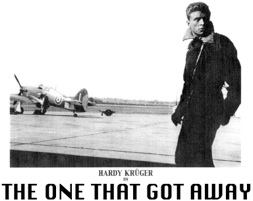> Deutsch

The young man's life as an extra didn’t last long. A road company with hardly any budget couldn’t afford a trained actor for the roles of a young comic, and signed him for a whole season.
The learning years had begun. Unsung stage directors trained his voice. Men of lost dreams showed him how to act. He told them how grateful he was, and that he would never forget.
Within a few years he played the big cities and performed in German films. Excellent directors such as Käutner, Braun, Jugert, or Weidenmann gave him good parts in their films, but the scripts he was handed by others were insipid, shallow, cheap. In contrast he saw great films coming out of England or France, and so he set off for Paris, determined to find work in excellent movies. But the people there, famous writers, directors, producers or stars, looked at him in disbelief. ”Mon dieu, un sale boche de nouveau!” they would say. “Look at you! Blue eyes! Blond hair! We had people who looked like you all over France – for years. Their arrogance is not forgotten. Nor are their crimes. Show us a grey uniform and we’re scared.”
The young German felt guilt. Felt shame. Didn’t know how to respond. Knew there was no way to respond. Gathering up courage, he travelled on. Put his car on a ferry, London bound. What he found there was silence. A young actress took a liking to him."You have to understand," she said, "there is hardly anyone here at Pinewood Studios, who hasn’t lost a lover, a husband, a son, a brother at the front. In an air raid. Or at sea."
He understood. And was about to give up hope. Considering going home, But the thought of Söhnker crossed his mind. And his words, In great anger spoken: "One day this war will be over, and we Germans will be reminded not only of the millions of deaths we have caused, but reminded also of people who were maimed, soldiers coming home from the front to find their homes in ruins.”
Remembering the friend who had risked his life to save the lives of others gave the young German strength. He decided to stay, to go to school, learning proper English, working hard to remove the foreign accent from his speech.
After six impatient months came the reward for the long wait: Roy Baker, one of the best directors of motion pictures in the British Isles, proved to be a man of courage. He chose the German actor to play a German pilot during WW II. Unexpectedly, his film The One That Got Away turned into a huge success, and made his leading man a star, the whole world over.
Source: Notes by Hardy Kruger
and his books Wanderjahre and Szenen eines Clowns.
1946–1957: INNOCENCE AND SHAME AND GUILT








